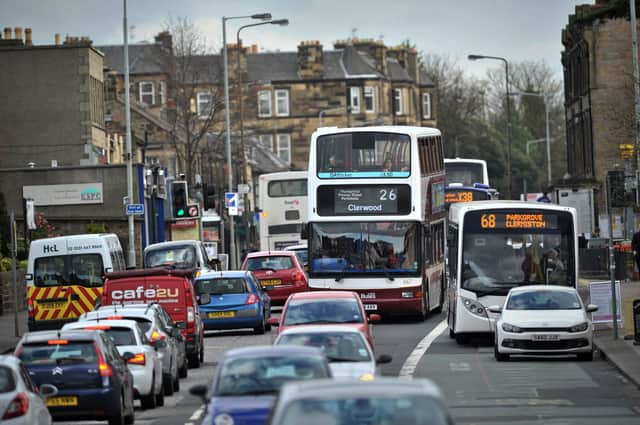Edinburgh's most polluted streets see biggest improvement in air quality during coronavirus lockdown


NEW figures show some of Edinburgh’s worst pollution hot spots have seen the biggest improvement in air quality since the coronavirus lockdown began.
Nitrogen dioxide levels in St John’s Road, Corstorphine, have fallen by 68 per cent and those in Nicolson Street and Queensferry Road by 61 per cent compared with normal readings before Covid.
Advertisement
Hide AdAdvertisement
Hide AdResearchers put the dramatic falls down to the massive reduction in traffic because of the lockdown, but said no-one knew what would happen after lockdown was lifted.
Dr Stuart Sneddon, of environmental consultancy Ricardo. which carried out the study, said: “There is the risk things might get worse as people move to maybe using their own cars, but this is what we’re seeing from the reduction in the volume of vehicles on the roads.
“There has been a greater understanding of air quality and people enjoying the better environment. We’re witnessing what is possible by working from home and having less vehicles on the road. How we implement that after lockdown is up for question - whether that’s maintaining lower volumes of traffic, using improved emissions-standard vehicles, newer vehicles or reduce emissions from vehicles technologically as we look for a greener future.”
The study also found improved air quality at other city sites, including a 55 per cent drop in NO2 levels at St Leonard’s, 54 per cent on Glasgow Road, 49 per cent on Gorgie Road, 31 per cent in Currie and 21 per cent in Salamander Street.
Advertisement
Hide AdAdvertisement
Hide AdDr Richard Dixon, director of Friends of the Earth Scotland, sounded a note of caution.
He said: “It’s important to keep in mind that pollution can damage our health through long-term exposure, like living near a main road throughout your childhood. It’s unlikely that a short period of reduced pollution due to the coronavirus shutdown will have long-term health benefits.
“There’s a strong evidence base on the links between air pollution and vulnerability to Covid-19. Pollution from traffic causes and exacerbates many of the heart and lung conditions that have put people at heightened risk from the virus.
“We need to see concerted action from both Edinburgh Council and the Scottish Government if we want these reductions in dangerous air pollution continued in a way that is fair to people and sustainable in the longer term.”
Advertisement
Hide AdAdvertisement
Hide AdBut he said some progress had been made. “The steps taken so far by council officers to make it safe and easy for people to walk or cycle are very welcome and should be maintained and expanded upon. We need to create both communities and commutes where walking and cycling are the easy, safe, default options for those people who can.”
And he called for the council to prioritise public transport, making it safe for workers and passengers by creating more space at bus stops, more bus lanes to speed journeys and buses with fewer passengers.
“The longstanding need to take action on air pollution to improve public health has only been heightened by this crisis. Equally, the current shutdown has exposed the need to reform our transport system and highlighted the fact that so much public space is dominated by polluting cars.”
Comment Guidelines
National World encourages reader discussion on our stories. User feedback, insights and back-and-forth exchanges add a rich layer of context to reporting. Please review our Community Guidelines before commenting.